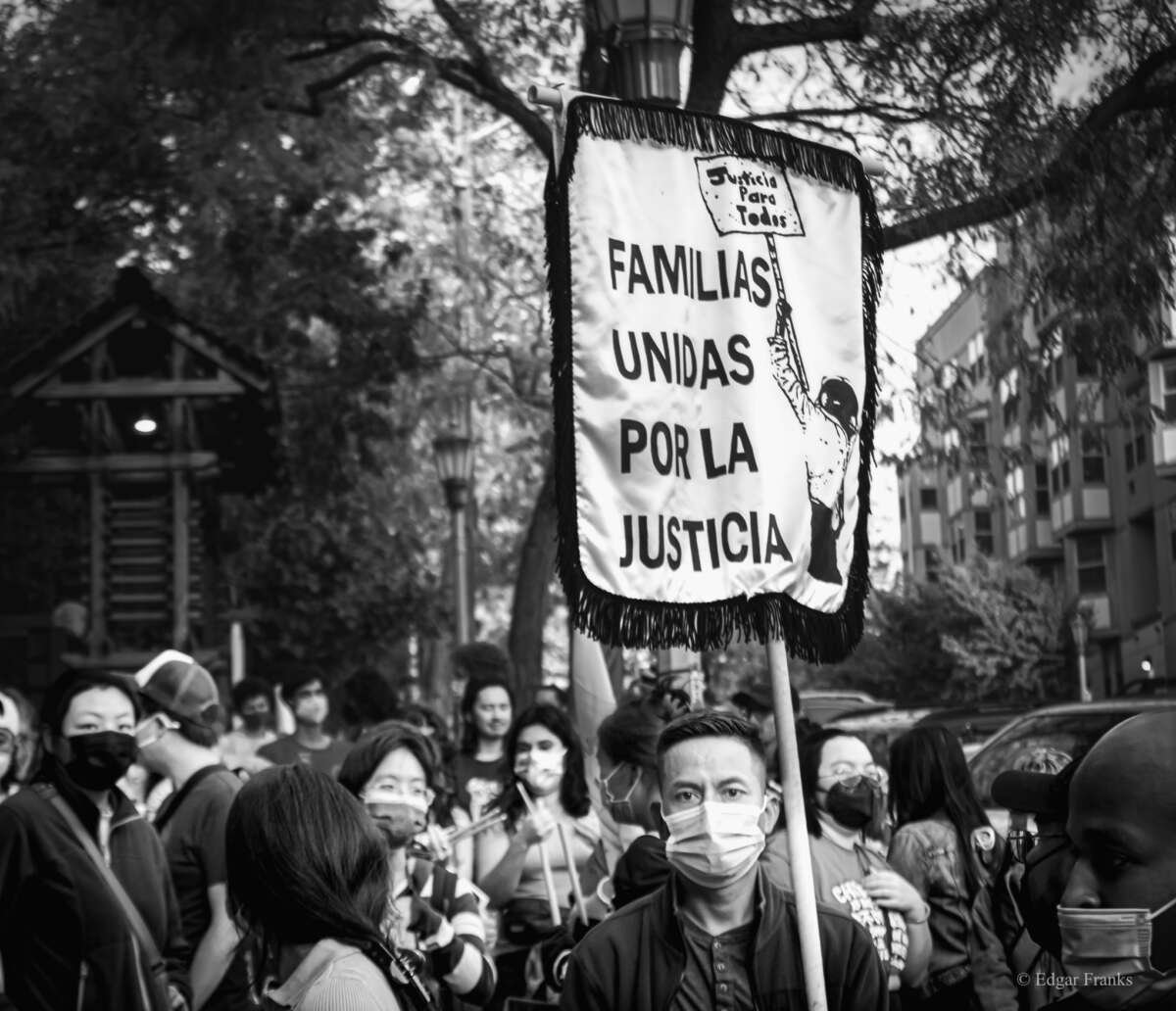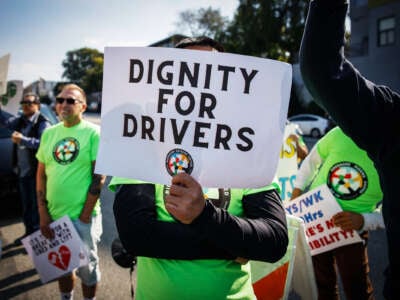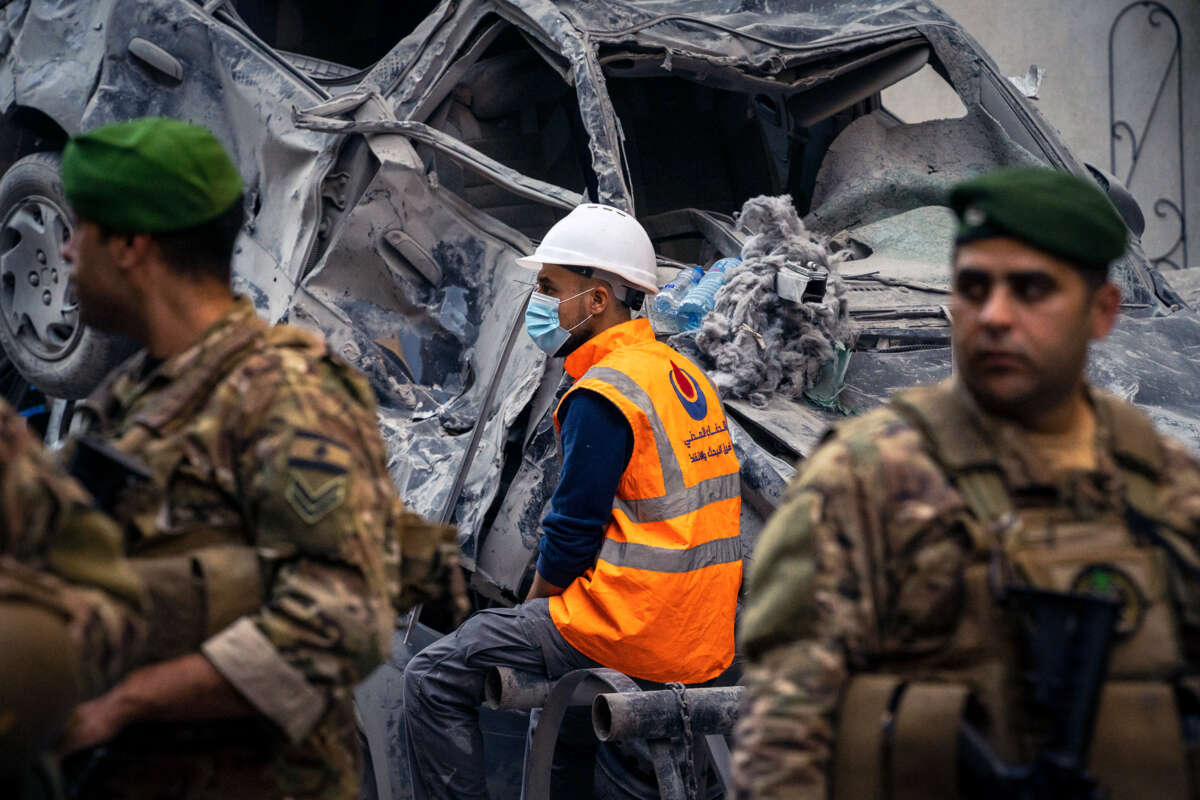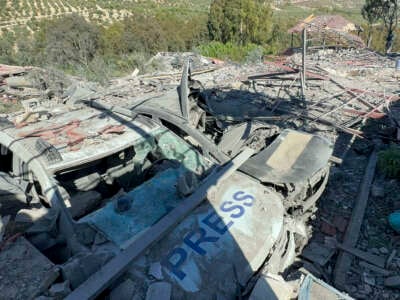Negotiators from Africa and elsewhere in the Global South huddle on the final day of the COP29 climate talks in Baku. Credit: IISD/ENB | Mike Muzurakis.
Negotiators from Africa arrived in Baku for the COP29 climate talks two weeks ago with many hopes and a few clear demands. Foremost among them were that the new climate finance goal, known as the New Collective Quantified Goal (NCQG), reflect the quantity and quality needed to address the Global South’s deepening climate needs. Concretely, that meant developed countries providing at least $1.3 trillion per year by 2035, of which $400-900 billion should take the form of public finance.
Two days late, exhausted and disappointed, the Global South left with a deal for just $300 billion to be raised through a “wide variety of sources”, including development bank loans and private finance.
We asked a range of experts, negotiators, researchers, and activists for their verdict on what unfolded at COP29 and where it leaves Africa.
Iskander Erzini Vernoit: It didn’t have to be this way
Baku was a betrayal of the world’s vulnerable, of the Paris Agreement, and of common sense. The COP29 decision on the new finance goal represents a staggering lack of imagination and solidarity from the Global North.
$300 billion per year as a mobilisation goal for 2035 would be a laughable joke, except it is deadly serious. People will lose their lives as a result of the unwillingness to take tough political decisions at COP29. According to some analyses, developing countries easily require over $1 trillion per year in grant-equivalent terms to equitably address adaptation and loss and damage alone, not counting mitigation and energy transition. This $300 billion, like the $100 billion goal it replaces, will likely be largely non-concessional loans. Meanwhile, the North’s subsidies for wars and fossil fuels amount to trillions per year.
This decision jeopardises the delivery of the aims of the Paris Agreement and UN Framework Convention, throwing national climate target-setting and delivery into deep uncertainty.
Amid rushed non-transparent processes, developed countries weaponised the fears of developing countries, who felt held hostage to the need to agree something before the Trump administration takes office. However, it didn’t have to be this way. The short-sighted inability to challenge the Global North’s un-ambition will likely be regretted, as will the COP Presidencies Troika’s insistence on closing any deal regardless of its contents.
Nevertheless, the fight against catastrophic climate change must move forward, in greater solidarity with those threatened, to become more clear-eyed about the problems and solutions, more unified and more politically assertive than before.
- Iskander Erzini Vernoit is executive director of the Imal Initiative for Climate and Development, a think tank based in Rabat, Morocco.
Evans Njewa: Years of our good faith efforts were met with indifference
We leave this COP with both pride and pain. Pride in the resilience of our bloc, which we fought valiantly for the survival of the most vulnerable, but we are pained that our hopes for true climate justice have not been met
The LDC [Least Developed Countries] Group is outraged and deeply hurt by the outcome of COP29. Once again, the countries most responsible for the climate crisis have failed us. We leave Baku without an ambitious climate finance goal, without concrete plans to limit global temperature rise to 1.5°C, and without the comprehensive support desperately needed for adaptation and loss and damage.
This is not just a failure; it is a betrayal. Three years of relentless effort by the Least Developed Countries (LDCs) engaging in good faith, building solutions, and striving for justice have been casually dismissed. Powerful nations have shown no leadership, no ambition, and no regard for the lives of billions of people on the frontlines of the climate crisis. The just ended UN Climate Change Conference has proven what we feared: the voices of our 1.1 billion people have been ignored.
Despite exhaustive efforts to collaborate with key players, our pleas were met with indifference. This outright dismissal erodes the fragile trust that underpins these negotiations and mocks the spirit of global solidarity. This outcome is a travesty. It sacrifices the needs of the world’s poorest and most vulnerable to protect the narrow interests of those who created this crisis. It prioritises profits and convenience over survival and justice.
- Evans Njewa is the Chair of the Least Developed Countries Group at UN Climate Change negotiations.
Fadhel Kaboub: The Global South will keep losing until it uses its geopolitical leverage
In the end, COP29 was not about climate. It was about an economic and geopolitical hierarchy that is not supposed to be disturbed. Why? Because real climate action would imply that climate finance is development finance. Real climate action means high quality transformative finance in the form of grants (not loans), cancellation of all climate-related debts (not rescheduling), and the sharing/transfer of life saving technologies to allow the Global South the manufacture and deploy the building blocks of climate resilience and adaptation – and that would unleash the full potential of the Global South as an economic powerhouse that is no longer locked at the bottom of the economic and geopolitical hierarchy. And that potential is perceived by the Global North as a threat to be managed and eliminated, not as an opportunity for development and climate action.
Unless the Global South recognises that we need to create a geopolitical leverage to pressure the historic polluters to act differently, we will continue to lose in every single multilateral space. We are the global majority. We can leverage the complementarity of our resources and capabilities to impose a new international economic order of justice, peace, and prosperity. If the historic polluters of the global minority do not get serious about its responsibilities, then we may have to start restricting access to our strategic minerals and our markets and start leveraging our collective economic weight to save the planet for all of humanity. No progress will be made in COP30 next year unless the Global South creates the geopolitical leverage it needs to level the playing field.
- Fadhel Kaboub is an associate professor of economics at Denison University and president of the Global Institute for Sustainable Prosperity.
Wafa Misrar: Africa will not back down, and the world cannot afford to lose us
The NCQG negotiations were an opportunity to rebuild trust and demonstrate real commitment to tackling the climate crisis. Instead, developed countries have chosen to sideline their historical responsibility and prioritise inaction over justice again. By proposing $300 billion, they have sent a chilling message: the lives, homes, and futures of those most affected by climate change do not matter.
As Ambassador Ali Mohamed, Chair of the African Group of Negotiators, powerfully reminded us: When Africa loses, the world loses its minerals, biodiversity, and stability. The fate of this continent is tied to the stability of the entire planet, and ignoring Africa’s call for fair and adequate climate finance risks global repercussions.
We, as African civil society organisations, stand united in calling on the Global North to recognise this undeniable truth. Take this inadequate proposal back, revisit your priorities, and return with a real commitment. No deal is better than a bad deal. The $100 billion promise of the Paris Agreement was a broken lifeline. Now, in 2024, offering $300 billion is a disrespect and an insult – not just to Africa, but to humanity.
This process cannot become a playground for profit-driven schemes like carbon markets or geoengineering. Climate finance must be public, equitable, and designed to address real loss and damage – not serve as a token gesture of charity. Africa will not back down. We will continue to hold the line until we see meaningful commitments that respect our rights, futures and dignity. The world cannot afford to lose Africa. And we cannot afford to lose ourselves again.
- Wafa Misrar is Campaign and Policy lead at Climate Action Network (CAN) Africa.
Ali Mohamed: We demanded clear targets and received none
Baku’s decisions failed to rebalance adaptation and mitigation financing. While the New Collective Quantified Goal appears in writing, its delivery is left to the uncertain goodwill of public and private actors. No guarantees exist that climate finance will come as grants, not debt-loading loans for vulnerable nations. Africa demanded clear targets for mitigation, adaptation and loss & damage management. We received none. Our task now is to translate words into action. Substantial finance flows must reach those on the frontlines – families forced to flee rising seas, farmers facing failed crops, and communities recovering from cyclones.
On the Global Goal on Adaptation, the necessary guidance to experts on their work gives us a platform upon which we can develop global indicators with local relevance, including indicators for support towards different elements of the targets.
- Ali Mohamed is the Chair of the African Group of Negotiators (AGN) at UN Climate Change negotiations.
Thato Gabaitse: A reminder that the system is designed to protect wealth, not justice
COP29 was billed as the “finance and gender COP”, a turning point. Instead, it became yet another testament to the neo-colonial, oppressive nature of the global climate system. While year after year, we engage with evidence expert findings, demanding transformative outcomes, instead we get hollow commitments that fail to reflect the urgency or equity required to tackle the climate crisis.
Take the 10-year Lima Work Programme on Gender, which should represent inclusivity and protection of gender-diverse lives impacted by the climate crisis and yet remains toothless. The failure to include and amplify gender-diverse voices in meaningful ways perpetuates exclusion and fails to address the systemic inequalities that worsen climate impacts for the most vulnerable. It sidelines the lived realities, needs, and leadership of the frontline communities.
Equally disheartening is the lack of commitment to financing a just energy transition. Wealthy nations have once again dodged their obligations under the Paris Agreement, offering peanuts for a fair energy transition.
The system is failing us, a reminder that it is designed to protect power and wealth rather than ensure justice and equity. Developed nations continue to exploit the resources, labour, and goodwill of the Global South while avoiding their historical responsibility for the climate crisis. The promise of a “just transition” becomes an empty phrase as fossil fuel dependency deepens to meet debt-servicing obligations.
While COP29 was another disappointment, we must fuel the collective momentum we built, to explore tools that will deliver a fast, fair and equitable just energy transition.
- Thato Gabaitse is the Development & Administrative Director at WE, The World.
Faten Aggad: A doubtful deal but now we look to COP30
Despite tensions and a significant level of mistrust generated by how the negotiating process was managed, a deal was delivered for the parties to take home. This demonstrated a clear commitment of the parties, especially developing countries, to remain constructive. The expectation from this goal was to signal ambition that would eventually underpin the design of the Nationally Determined Contributions (NDCs) expected to be delivered at COP30 in Belém and address the shortfalls of the implementation of the $100 billion goal. We got a deal but whether it delivered on expectations is doubtful.
The commitment to deliver $300 billion is a symbolic but minimal increase from the $100 billion floor taking into account inflation. It remains below the $1.3 trillion figure asked for by developing countries let alone their real needs. The text also does not secure high quality financing in the form of grants and concessional finance although admittedly provides guidance on how it can be addressed by acknowledging the role of debt, for example. It is now incumbent on institutions with decision making power over these issues to act upon the decision of COP29.
That being said, the silver lining is that the final text does not speak of a final goal. The launch of the Baku to Belém Roadmap towards the $1.3 trillion figure means that the pledged $300 billion is a floor and acknowledges therefore that more efforts are required to meet the needs of developing countries. This is a welcomed development that will ensure that the negotiations continue. Ensuring that the process is more consultative and inclusive than it has been over the last two weeks of negotiations will hopefully help land a more acceptable financial commitment by COP30. This will be crucial if developing countries are to deliver ambitious NDCs. For now it is just a rain check!
- Faten Aggad is Executive Director of the African Future Policies Hub (AFPH).
Mohamed Adow: Rich countries staged a great escape, and a betrayal of people and planet
This COP has been a disaster for the developing world. Sadly, it has been a betrayal of both people and planet by wealthy countries who claim to take climate change seriously.
Rich countries have promised to “mobilise” some funds in the future, rather than provide them now. It’s like they are saying “the cheque is in the mail”. But lives and livelihoods across Africa are being lost now. The rich world staged a great escape in Baku. With no real money on the table, and vague and unaccountable promises of funds to be mobilised, they are trying to shirk their climate finance obligations.
Part of the problem was how shamefully the hosts Azerbaijan led the summit. It has been a global embarrassment for the wealthy countries, and the COP president that allowed them to dodge their obligations. Next year’s meeting in Brazil should be much better coordinated.
African leaders must now look to pool their complementary resources, work together, and seek opportunities to harness its great clean energy potential. We now need to seek ways of attracting the right investments into the continent to make us a renewable energy superpower.
- Mohamed Adow is the director of Power Shift Africa.
Critics of the "COP of false solutions" said that instead of much-needed funding, developing nations got "a global Ponzi scheme that the private equity vultures and public relations people will now exploit."
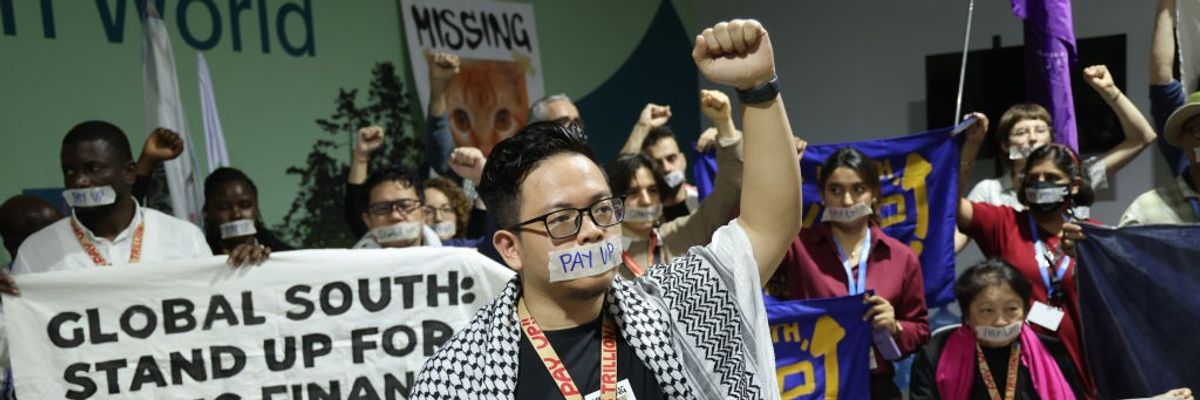
Activists demanding that rich countries pay up for climate finance protest at COP29 in Baku, Azerbaijan on November 22, 2024.
(Photo: Sean Gallup/Getty Images)
Jessica Corbett
Nov 23, 2024
COMMON DREAMS
It was early Sunday by the time the United Nations climate summit wrapped up in Baku, Azerbaijan after running into overtime to finalize deals on carbon markets and funding for developing countries that were sharply condemned by campaigners worldwide.
"COP29 was a dumpster fire. Except it's not trash that's burning—it's our planet," declared Nikki Reisch of the Center for International Environmental Law. "And developed countries are holding both the matches and the firehose."
Recalling last year's conference in the United Arab Emirates, Oil Change International global policy senior strategist Shady Khalil highlighted that "the world made a deal at COP28 to end the fossil fuel era. Now, at COP29, countries seem to have been struck with collective amnesia."
"With each new iteration of the texts, oil and gas producers managed to dilute the urgent commitment to phase out fossil fuels," Khalil said. "But let's be clear: Rich countries' failure to lead on fossil fuel phaseout and to put the trillions they have hoarded on the table has done more to imperil the energy transition than any obstructionist tactics from oil and gas producers."
This year's conference began November 11 and was due to conclude on Friday, but parties to the Paris agreement were still negotiating the carbon market rules, which were finalized late Saturday, and the new collective quantified goal (NCQG) on climate finance.
"The carbon markets in Article 6 of the Paris agreement were pushed through COP29 in a take-it-or leave-it outcome," said Tamra Gilbertson of Indigenous Environmental Network, decrying "a new dangerous era in climate change negotiations."
As Climate Home Newsreported, they establish two types of markets: "The first—known as Article 6.2—regulates bilateral carbon trading between countries, while Article 6.4 creates a global crediting mechanism for countries to sell emissions reductions."
The outlet pointed to expert warnings that "the rules for bilateral trades under 6.2 could open the door for the sale of junk carbon credits—one of the weaknesses of the previous crediting mechanism set up by the U.N. known as the Clean Development Mechanism (CDM)."
Jonathan Crook of Carbon Market Watch said in a statement that "the package does not shine enough light on an already opaque system where countries won't be required to provide information about their deals well ahead of actual trades."
"Even worse, the last opportunity to strengthen the critically weak review process was largely missed," he continued. "Countries remain free to trade carbon credits that are of low quality, or even fail to comply with Article 6.2 rules, without any real oversight."
As for Article 6.4, “much lies in the hands of the supervisory body" that's set to resume work in early 2025, said Crook's colleague, Federica Dossi. "To show that it is ready to learn from past mistakes, it will have to take tough decisions next year and ensure that Article 6.4 credits will be markedly better than the units that old CDM projects will generate."
"If they are not, they will have to compete in a low-trust, low-integrity market where prices are likely to be at rock bottom and interest will be low," Dossi added. "Such a system would be a distraction, and a waste of 10 years worth of carbon market negotiations."
Some campaigners suggested that no matter what lies ahead, the embrace of carbon markets represents a failure. Kirtana Chandrasekaran at Friends of the Earth International said that "the supposed 'COP of climate finance' has turned into the 'COP of false solutions.' The U.N. has given its stamp of approval to fraudulent and failed carbon markets."
"We have seen the impacts of these schemes: land grabs, Indigenous peoples' and human rights violations," Chandrasekaran noted. "The now-operationalized U.N. global carbon market may well be worse than existing voluntary ones and will continue to provide a get out of jail free card to Big Polluters whilst devastating communities and ecosystems."
Chandrasekaran's colleague Seán McLoughlin at Friends of the Earth Ireland was similarly critical of the conference's finance deal, asserting that "Baku is a big F U to climate justice, to the poorest communities who are on the frontlines of climate breakdown."
"COP29 has failed those who have done least to cause climate change and who are most vulnerable to climate breakdown because the process is still in thrall to fossil fuel bullies and rich countries more committed to shirking their historical responsibility than safeguarding our common future," he said. "Now it's back to citizens to demand our governments do the right thing. We must keep demanding the trillions, not billions owed in climate debt and a comprehensive, swift, and equitable fossil fuel phaseout. The struggle for climate justice is not over."
Campaigners and developing nations fought for $1.3 trillion in annual climate finance from those most responsible for the planetary crisis. Instead, the NCQG document only directs developed countries to provide the Global South with $300 billion per year by 2035, with a goal of reaching the higher figure by also seeking funds from private sources.
The deal almost didn't happen at all. As The Guardiandetailed Saturday: "Developed countries including the U.K., the U.S., and E.U. members were pushed into raising their offer from an original $250 billion a year tabled on Friday, to $300 billion. Poor countries argued for more, and in the early evening two groups representing some of the world's poorest countries walked out of one key meeting, threatening to collapse the negotiations."
While Simon Stiell, executive secretary of U.N. Climate Change, celebrated the NCQG as "an insurance policy for humanity, amid worsening climate impacts hitting every country," Chiara Martinelli, director at Climate Action Network Europe, put it in the context of the $100 billion target set in 2009, which wealthy governments didn't meet.
"Rich countries own the responsibility for the failed outcome at COP29," Martinelli said. "The talk of tripling from the $100 billion goal might sound impressive, but in reality, it falls far short, barely increasing from the previous commitment when adjusted for inflation and considering the bulk of this money will come in the form of unsustainable loans. This is not solidarity. It's smoke and mirrors that betray the needs of those on the frontlines of the climate crisis."
Also stressing that "it's not even real 'money,' by and large," but rather "a motley mix of loans and privatized investment," Oxfam International's climate change policy lead, Nafkote Dabi, called the agreement "a global Ponzi scheme that the private equity vultures and public relations people will now exploit."
"The terrible verdict from the Baku climate talks shows that rich countries view the Global South as ultimately expendable, like pawns on a chessboard," Dabi charged. "The $300 billion so-called 'deal' that poorer countries have been bullied into accepting is unserious and dangerous—a soulless triumph for the rich, but a genuine disaster for our planet and communities who are being flooded, starved, and displaced today by climate breakdown."
Rachel Cleetus from the Union of Concerned Scientists, who is in Baku, took aim at not only rich governments, but also the host, saying that "the Azerbaijani COP29 Presidency's ineptitude in brokering an agreement at this consequential climate finance COP will go down in ignominy."
Cleetus' group is based in the United States, which is preparing for a January transfer of power from Democratic President Joe Biden to Republican President-elect Donald Trump, who notably ditched the Paris agreement during his first term.
"The United States—the world's largest historical contributor of heat-trapping emissions—is going to see a monumental shift in its global diplomacy posture as the incoming anti-science Trump administration will likely exit the Paris agreement and take a wrecking ball to domestic climate and clean energy policies," Cleetus warned. "While some politically and economically popular clean energy policies may prove durable and action from forward-looking states and businesses will be significant, there's no doubt that a lack of robust federal leadership will leave U.S. climate action hobbled for a time."
"Other nations—including E.U. countries and China—will need to do what they can to fill the void," she stressed. "Between now and COP30 in Brazil next year, nations have a lot of ground to make up to have any hope of limiting runaway climate change."
Ben Goloff of the U.S.-based Center for Biological Diversity called out the departing Biden administration, arguing that it "should be going out with at least a signal of its moral climate commitment, not copping out ahead of the Trump 2.0 disaster."
What’s on Deck for Climate Change?
Dr. Peter Carter, an Expert Reviewer of the Intergovernmental Panel on Climate Change (IPCC), has new information about the status of climate change that meets the IPCC 6th Assessment worst-case scenario. Carter makes the case that the climate system is several years ahead of expectations, and in fact, knocking on the door of the IPCC’s 6th Assessment worst-case scenario decades early.
Experts on climate change are at a loss for words and at a loss for understanding how and why the climate change issue, which is negatively impacting planetary ecosystems, is largely ignored. The proof of this is found at the celebrated UN climate conferences, where talk is cheap, like COP29 held in oil-rich Azerbaijan. These are annual events with a long history of poor results. This frustrating stagnation has been ongoing for over 30 years.
Meanwhile, climate denialists, including the entire Republican Party, have brainwashed the public that climate change is not all that it’s cracked out to be, “no worries, it’s a hoax, ignore the radical leftists, ignore science, and oh, yes, they are communists.”
However, the climate system is not listening to fairy tales. It’s on a tear that’s broadcast nightly via headline news re super hurricanes: “Disastrous Hurricane Season Cost Soar Past $100 Billion in US, Estimates Say,” USA Today, November 1, 2024. And severe drought that threatens the existence of the Amazon rainforest, The Shriveling Mighty Amazon River Drying Out, October 11, 2024, as Antarctic glaciers slip slide away: Scientists in Chile Question Whether Antarctica Has Hit a Point of No Return, Reuters, August 8, 2024.
The world has changed like never before.
Meanwhile, insurance premiums for home ownership skyrocket, especially Florida and California. Climate change is challenging homeownership as some insurers in regions where radical climate change hit hardest drop coverage altogether: “Cimate Change Should Make You Rethink Homeownership,” New York Times, October 29, 2024.
And: “Climate Change, Disaster Risk, and Homeowner’s Insurance,” Congressional Budget Office, August 2024. How do deniers explain this?
When studying climate change, there are climate scientists and advocates of all sorts, but few understand and relate the true impact as well as Dr. Peter Carter, who’s studied the science since 1988 and an Expert Reviewer of IPCC reports. His analyses go to the core of the climate change issue. He’s openly critical of the failures of national economies to act quickly enough, and he’s on a warpath to crush climate deniers that preach falsehoods.
Tough Climate Times Ahead
Dr. Peter Carter (retired physician and founder of Climate Emergency Institute, est. 2008) posted a climate update, “November 2024: Tough Climate Times Ahead.” A synopsis of his report, in part, follows herein:
Ever since the IPCC 2018 1.5C warning of a climate emergency that required immediate mitigation efforts by major economies of the world to hold temps to 1.5C pre-industrial, everybody that can make a difference has sort of disappeared while the emergency gets worse, and worse. Where are they?
With the ranks of active advocates shrinking, Carter has appealed for help in taking the case to the major nations of the world, reaching out to climate scientists to get involved publicly by telling it like it is, making the case for immediate mitigation measures to stem “a dire climate emergency.”
And he’s looking for help to counter massive denial campaigns, especially in the U.S.: “There’s still dangerous climate change denial.” Social media is full of ridiculous denials, which originate from fossil fuel corporations and from the Republican Party. It’s not just Trump who is skeptical; it’s the whole Republican Party.
However, there’s plenty of news to dispel the lies.
The US has suffered back-to-back powerful hurricanes, not totally unusual, but the intensity is very unusual and off-the-charts bred by abrupt climate change. Hurricanes have caused $100B damage.
These things don’t happen by themselves in isolation. Human influence has changed the climate and not for the better. It’s important to connect the dots of what is happening right before our eyes, meaning fossil fuel companies, big banks, and big economy governments all threaded to climate change: “They must be held accountable… They are getting away with mass murder on a scale we have never seen before.” (Carter)
It’s a scientific fact that as the lower atmosphere warms via greenhouse gases, the more moisture it holds. Moreover, with tropical storms, water vapor increases five-to-seven times per degree of Centigrade, resulting in torrential rains, atmospheric rivers, and floods, some of the most damaging aspects of climate change.
For example, because the UK is experiencing much heavier rains than ever before, agricultural fields become waterlogged, resulting in a decline of agricultural production. This new era of extreme climate behavior impacts food supply, as the UK suffers from “weather whiplash”: “Climate Change is a Growing Threat to UK Farming,” Yale Climate Connections, October 25, 2024.
The IPCC 6th Assessment calls for immediate action on global emissions, but that call to action is nowhere to be found; it’s not happening. Therefore, we must force governments to stop subsidizing fossil fuels, a dead-end industry. For decades we’ve known fossil fuels can be completely replaced by renewables as “Fossil Fuel Subsidies Surge to Record $7 Trillion,” IMF, Aug. 24, 2023. Imagine splurging $7 Trillion per year on renewables, a 10-fold increase over current spending.
Shocking New News for 2024
“It’s very clear climate change is no longer decades in the future. It’s very obvious it’s happening now, so we need to adapt.” (Jim Skea, chairman IPCC)
“The whole of Europe is vulnerable and especially the Mediterranean. We are already seeing desertification taking place, not only in North Africa, but some of the southern margins of Europe, like Greece, Portugal and Turkey,” (Jim Skea)
The Telegraph interviewed IPCC Chair Jim Skea: It’s too Late to save Britain from Overheating, Says UN Climate Chief, October 5, 2024. According to the interview, humanity has lost the opportunity to hold global temperature to 1.5C. And it will take a heroic effort to limit it to 2C.
Since the mid 1990s, the ultimate danger has been set at 2C above pre-industrial, which incidentally, according to Dr. Carter, is catastrophe on a global basis. All tipping points will be triggered at that level… then, it’s too late.
The most feared tipping point is permafrost thaw, which is emitting more and more CO2 (carbon dioxide) and CH4 (methane) than ever. It is melting in the Arctic and subarctic regions, emitting three major greenhouse gases, CO2, CH4 and N2O (nitrous oxide). Atmospheric CH4 is going up a lot.
“The observed growth in methane emissions follows the Intergovernmental Panel on Climate Change’s most pessimistic greenhouse gas scenarios, which predict global temperatures could rise above 3°C by the century’s end if such trends continue.” (Source: “The 2024 Global Methane Budget Reveals Alarming Trends,” The European Space Agency, October 9, 2024)
According to Dr. Carter, scientists are uniformly agreed that the permafrost plight may be irreversible. In the most recent The State of the Cryosphere Report scientists claim permafrost melt is so bad/threatening that people should “be frightened.” This alone should motivate worldwide mitigation measures to halt CO2 emissions.
Alas, permafrost is now officially competing with cars, trains, planes, and industry: “An international team, led by researchers at Stockholm University, discovered that from 2000 to 2020, carbon dioxide uptake by the land was largely offset by emissions from it.” (Source: “NASA Helps Find Thawing Permafrost Adds to Near-Term Global Warming,” NASA Jet Propulsion Laboratory, October 29, 2024)
Moreover, some of the most shocking news is the State of Climate Change Report in 2023 of huge global surface increases in temperature, part of which was El Nino related, but it was not nearly powerful enough to kick up temperatures so radically. Obviously, something else was at work. Putting the 2023 experience of massive heat into IPCC projections, it hits the “very worst-case scenario category,” because the planet is now tracking above the worst-case scenarios at 8.5 W/m² (watts per square meter) which measures the radiative forcing that heats the planet. This is serious trouble.
[Side Note: According to NOAA data, the Earth’s average radiative forcing in 2000 was approximately 2.43 W/m², with most of this forcing coming from increased carbon dioxide levels in the atmosphere. “Before the industrial era, incoming and outgoing radiation were in very close balance, and the Earth’s average temperature was more or less stable” – MIT Climate Portal]
A major source behind the issue is straight-forward: We’ve never produced or burned more coal than today. It’s the worst thing we can do. According to the International Energy Agency (IEA) in 2023 global coal usage reached an all-time high, driven by strong demand in China and India, with production also peaking at record levels… for 2024, global coal demand is expected to remain largely flat with production levels of 2023. This crushes Paris ’15.
Earth’s Carbon Sinks Are Failing
Earth’s carbon sinks are losing efficiency. This is horrific news. The Global Carbon Project of the past three years discovered land and ocean carbon sinks starting to lose efficiency. According to Dr. Carter, “this is a terrifying development.” We may be losing our most important natural buffers by up to 50%. The IPCC didn’t expect this to happen until after 2050, if at all, but it’s here now.
A recent study claims the planet’s overall carbon sink absorbed zero carbon or negligible amounts last year. This is the shocker of the year. Well, actually, it’s the shocker of the century. It’s a game-changer, and a devastating climate curse.
The Global Carbon Project 2nd Assessment on the status of methane CH4 and nitrous oxide N2O found each greenhouse gas to be tracking the “IPCC worst-case scenario.” This confirms Dr. Carter’s overriding thesis that we’re pushing the climate system to the edge of a dangerous spiral.
Carter: “Yes, honestly, it is time to panic…. but mysteriously there is no panic in the world.” The 2nd Assessment found all three greenhouse gases going up faster than anybody ever thought possible.
Is there hope?
Dr. Carter says we must communicate with people and tell the truth. We must make sure the world knows we are in a global climate planetary emergency. All kinds of emergency declarations were initiated in 2018 with the alarming IPCC 1.5C warning, but it has faded; it is gone. That warning can be put back into place. And we must harass politicians “to stop fossil fuels, to stop wiping out our future.” And hold corporations accountable. And stop harassing and jailing peaceful climate protestors.
There are possibilities of hope because we have the nuts and bolts of renewables to replace fossil fuels many times over. But fossil fuels are increasing at the same rate, or faster, as renewables. This is a road to nowhere.
In summation, the climate system is tracking above the IPCC’s worst-case scenario, and in Dr. Carter’s words: “It is time to panic: Yes, panic.” But who really knows this? And who really knows but could care less? Something somehow must be done well in advance of the world suddenly waking up one day when it’s too late with the sudden realization: “We are screwed.”
Academy Award Nominee Don’t Look Up (2021) is a perfect analogy for today’s situation.
The storyline: Astronomy grad student Kate Dibiasky (Jennifer Lawrence) and her professor Dr. Randall Mindy (Leonardo DiCaprio) discover a comet the size of Mount Everest headed straight for Earth. Warned by Dibiasky and Mindy, the political establishment, brushing off the astronomers while they’re preoccupied with an election campaign, adopt a political slogan: “Don’t Look Up” to win the election.
Sound familiar?

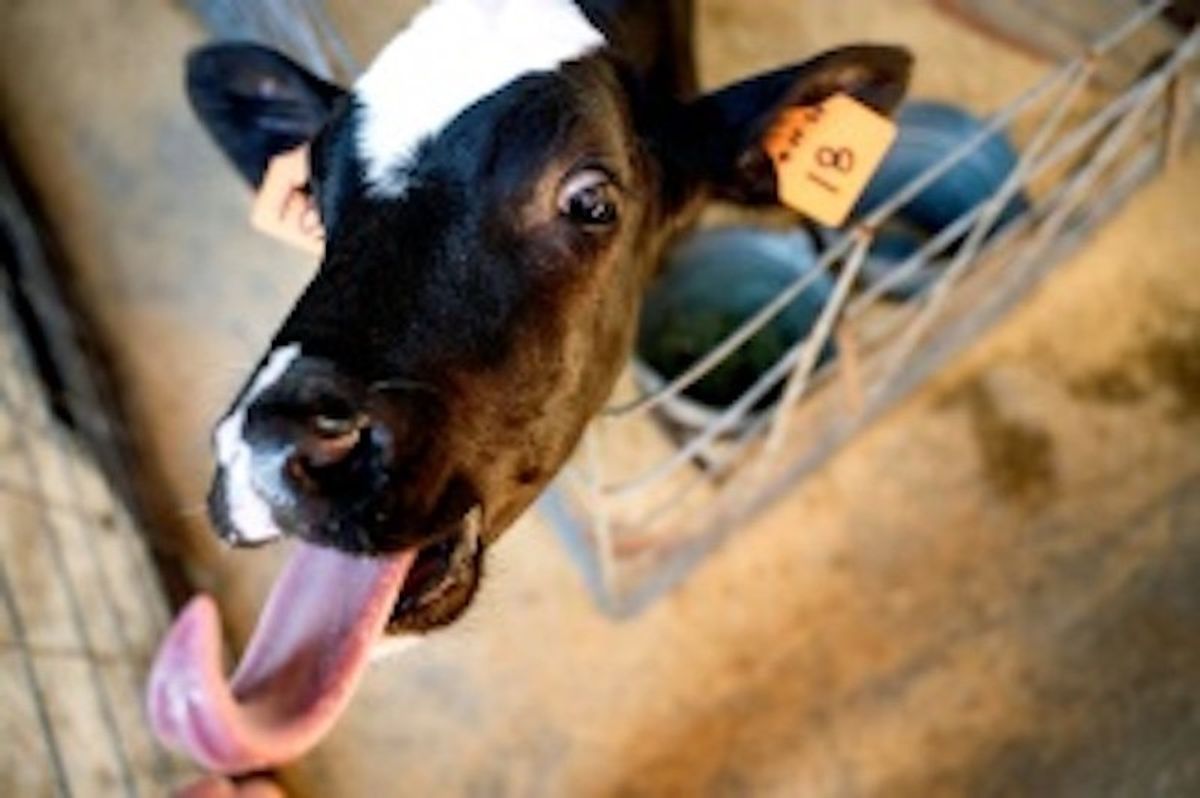
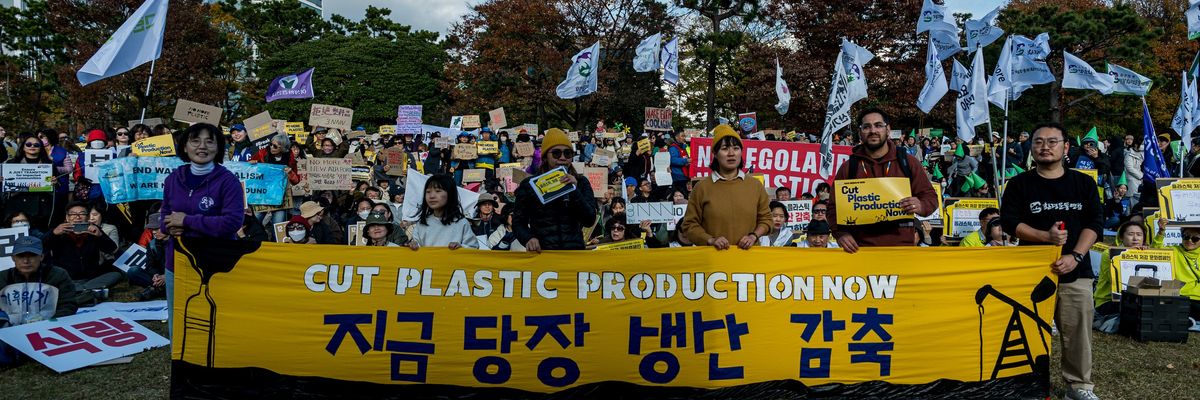






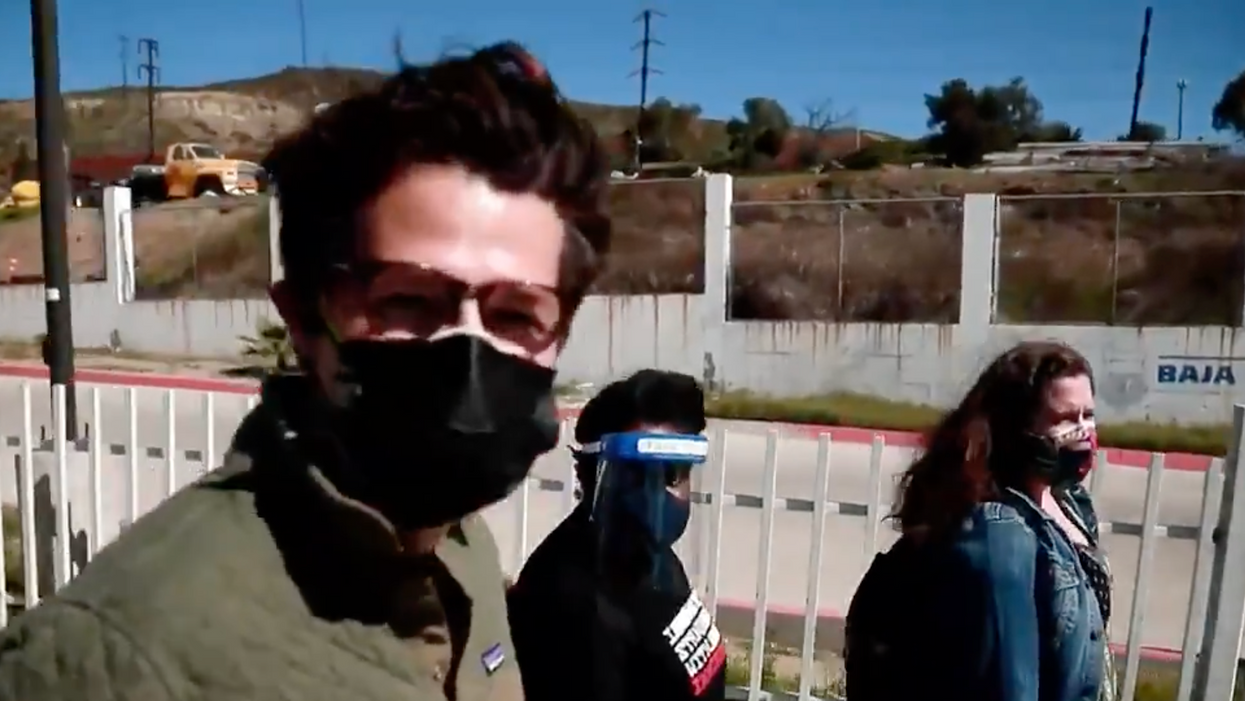
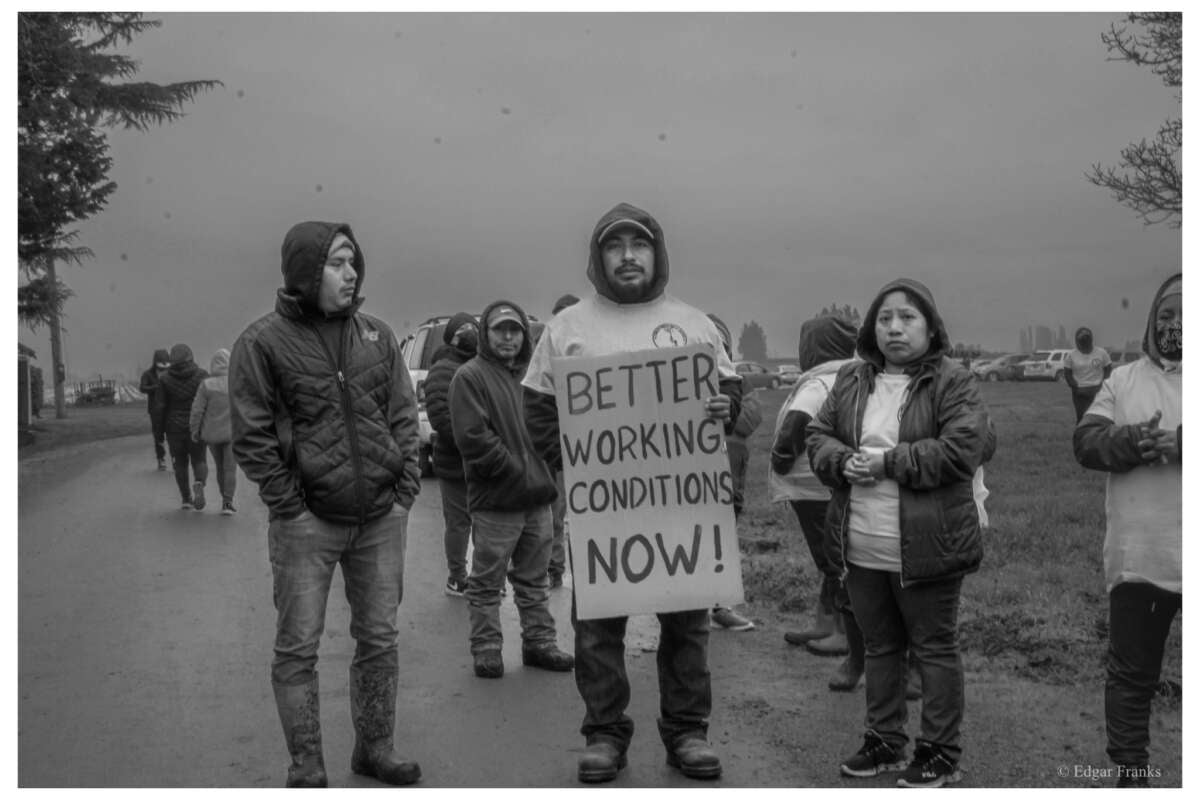 Benito Lopez, a Familias Unidas por la Justicia union member, at a picket line during a strike at a Tulip farm in Mount Vernon, Washington, in March 2022.Edgar Franks / Familias Unidas por la Justicia
Benito Lopez, a Familias Unidas por la Justicia union member, at a picket line during a strike at a Tulip farm in Mount Vernon, Washington, in March 2022.Edgar Franks / Familias Unidas por la Justicia
